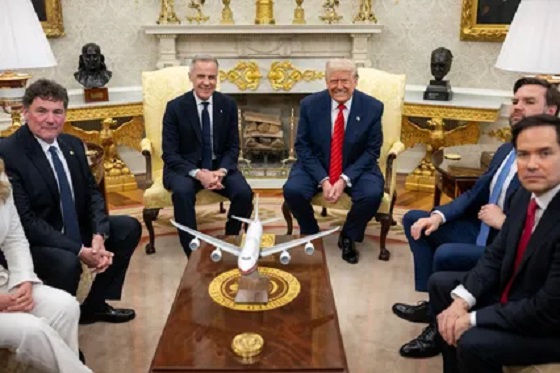Crime
U.S. Charges Sinaloa Cartel Leaders With Narco-Terrorism After Record Fentanyl Seizure

 Sam Cooper
Sam Cooper
Mexican law enforcement, acting in coordination with U.S. agencies, raided multiple BLO-run fentanyl superlabs in Sinaloa on December 3, 2024, seizing 1,500 kilograms—over 1.65 tons—of fentanyl, a volume U.S. officials say constitutes the largest single fentanyl seizure in the world to date.
In a sweeping escalation of America’s war on cartel-driven drug violence, U.S. authorities have unsealed the nation’s first-ever narco-terrorism indictment against alleged leaders of the Sinaloa Cartel—following the world’s largest fentanyl seizure late last year in Mexico.
Federal prosecutors in the Southern District of California announced charges Tuesday against Pedro Inzunza Noriega and his son, Pedro Inzunza Coronel, accusing the pair of operating one of the world’s most prolific and violent fentanyl trafficking operations under the Beltran Leyva Organization (BLO), an ultra-violent faction of the Sinaloa Cartel. The charges include narco-terrorism, material support of terrorism, drug trafficking, and money laundering.
The historic indictment stems directly from President Donald Trump’s Executive Order 14157, which designated the Sinaloa Cartel as a Foreign Terrorist Organization. The designation was formalized by the Secretary of State on February 20, 2025.
According to court filings, Mexican law enforcement, acting in coordination with U.S. agencies, raided multiple BLO-run fentanyl superlabs in Sinaloa on December 3, 2024, seizing 1,500 kilograms—over 1.65 tons—of fentanyl, a volume U.S. officials say constitutes the largest single fentanyl seizure in the world to date.
Among the narcotics seized were rainbow-colored fentanyl pills—of the type Drug Enforcement Administration sources say are deliberately marketed to young people—as well as fentanyl bricks stamped with “Louis Vuitton” and “Rolls Royce” brand marks.
The designation of these narco cells as terrorists is more than legal jargon to senior U.S. officials. Tom Homan, President Trump’s appointed border czar, has called for aggressive, coordinated action against Mexican cartels. He argues that the United States should conduct military-style operations in partnership with Mexican authorities to dismantle these groups, which he says are fueling destabilizing violence, including the murders of thousands of journalists, public officials, and civilians, while corrupting entire tiers of government through terror and coercion.
“We need to play the away game, play where they’re at,” Homan said in a recent interview. Rep. Dan Crenshaw, a former Navy SEAL and Texas congressman, shared the clip, adding, “Homan gets it.”
This alignment between Homan and Crenshaw underscores a growing consensus among some U.S. officials that cartels should be confronted with the same urgency—and the same operational tactics—that U.S. Special Forces have used against terrorist networks in Middle Eastern war zones.
“This is what justice looks like when the full measure of the Department of Justice and its law enforcement partners is brought to bear,” said U.S. Attorney Adam Gordon of the Southern District of California. “Narco-terrorists operate as a cancer within a state. If left unchecked, their growth would lead to the death of law and order.”
Attorney General Pamela Bondi said the Inzunzas, whose organization operates with violent impunity across key trafficking corridors like Tijuana, have brutalized the American people without consequence for too long.
“We will seek life in prison for these terrorists,” Bondi stated.
The charges are part of Operation Take Back America, a nationwide initiative that marshals the full resources of the Department of Justice to repel the invasion of illegal immigration, achieve the total elimination of cartels and transnational criminal organizations, and protect U.S. communities from violent crime. The operation streamlines enforcement across the Department’s Organized Crime Drug Enforcement Task Forces and Project Safe Neighborhoods.
Five other BLO figures—described as high-ranking cartel leaders—were also charged with trafficking and laundering profits from heroin, cocaine, methamphetamine, and fentanyl in the United States. All are accused of helping sustain an empire of murders, kidnappings, torture, and violent collection of drug debts to finance their global operations.
“This group is responsible for some of the largest-ever seizures of fentanyl and cocaine targeting the U.S.,” said FBI Acting Special Agent in Charge Houtan Moshrefi. “Their drugs destroy lives and communities, but they also threaten our national security.”
The indictment marks the first case brought by the Southern District of California’s newly established Narco-Terrorism Unit, launched last month following Gordon’s appointment. It signals a strategic shift in U.S. prosecutions of cartel activity—treating such groups as transnational insurgents rather than traditional criminal enterprises.
In addition to the Inzunzas, federal prosecutors confirmed that long-standing indictments remain active against several top-tier Sinaloa and BLO leaders:
Fausto Isidro Meza Flores aka “Chapo Isidro”
Oscar Manuel Gastelum Iribe aka “El Musico”
Ivan Archivaldo Guzman Salazar aka “El Chapito”
Ismael Zambada Sicairos aka “Mayito Flaco”
Jose Gil Caro Quintero aka “El Chino”
Together, these men represent what prosecutors described as the military-grade leadership of a cartel apparatus now formally treated as a terrorist threat to the United States.
“Cartel-driven drug trafficking is not just criminal—it’s insurgent,” said Special Agent Shawn Gibson of Homeland Security Investigations San Diego. “We are lasered in on dismantling every node of these terror networks.”
The Bureau is a reader-supported publication.
To receive new posts and support my work, consider becoming a free or paid subscriber.
Invite your friends and earn rewards
Crime
RCMP warns Central Alberta property owners of paving contractor scams

News release from Innisfail RCMP
Innisfail RCMP is warning the public about asphalt-paving company scams in the area. Out-of-town companies, claiming to be pavers, are offering their services at an inexpensive rate. Residents are paying for the service up-front and then receiving a sub-standard job or being asked to pay more than the original quote. These companies, who will sometimes also offer roof sealing services, will then disappear from the area before people realise they have been scammed. These individuals have been known to provide few details of their identity and utilize non-descript vehicles rarely bearing commercial logos. Some of these fraudulent companies do have logos to appear legitimate.
Innisfail RCMP urges property owners to beware of out-of-town companies offering such services. The contractors claim to have leftover asphalt from previous jobs and promise to provide quality services. However, the product used is believed to be cold, recycled asphalt or a gravel and oil mixture with no lasting properties. This results in the asphalt falling apart once it is driven on. We would like to remind residents to exercise caution when retaining contractor services and, if it sounds too good to be true, then it probably is. Citizens are advised to be cautious of any cold approach or unsolicited offers from paving companies.
Residents should be weary of any contractors who:
- Come to your door saying they are working in the area and offering a deal for leftover asphalt
- Drive vehicles bearing no business names or logos
- Pressure you into making a quick decision or refuse to take “no” for an answer
- Ask for a down payment to buy materials
- Refuse to give you a written quote with their business name, physical address and outlining the services they will provide prior to completing the work
Here are a few tips to avoid falling prey to scammers:
- Before agreeing to a contract with a person who comes to your door, get names of their previous customers and verify that they were satisfied with the work.
- Do some research on the company with either the Better Business Bureau in Alberta, with the Consumer Investigations Unit, with your local Rural Crime Watch or on social media sites.
- Make sure to obtain a written quote from the contractor that includes the full business name, full address, phone number, GST number and provincial and municipal license numbers, if applicable.
- Ensure the quote you receive gives details such as the quantity and the quality of materials being offered.
- Obtain quotes from local suppliers as a form of comparison.
If you are approached by a paving company and you are concerned that it is suspicious, please do not hesitate to contact the RCMP.
If you, or anyone you know, has fallen victim to this scam, contact the Innisfail RCMP Detachment at (403) 227-3342, or your local police. If you wish to remain anonymous, you can contact Crime Stoppers at 1-800-222-8477 (TIPS) online at www.P3Tips.com or by using the “P3 Tips” app available through the Apple App or Google Play Store.
Crime
Veteran RCMP Investigator Warns of Coordinated Hybrid Warfare Targeting Canada
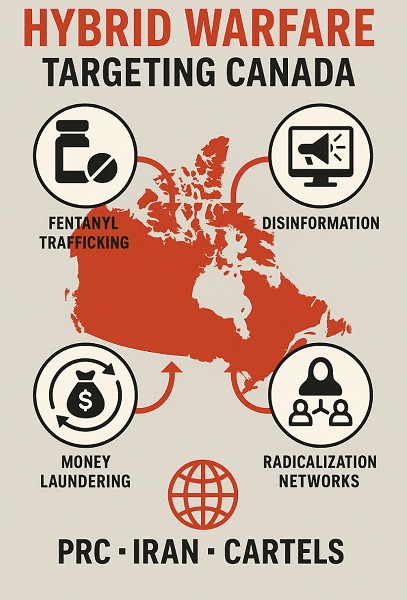
 Sam Cooper
Sam Cooper
Central to this strategy is fentanyl—a substance whose reach now extends far beyond Canadian borders.
Fentanyl overdoses. Dirty money flooding real estate. Election interference. Foreign-backed antisemitism igniting across Canadian campuses. These are not isolated crises, warns Calvin Chrustie, a veteran RCMP national security and transnational crime investigator. They are interlinked weapons in an accelerating campaign of hybrid warfare targeting Canada—one that is hollowing out state institutions, fracturing social cohesion, and damaging our alliances. In the view of Chrustie, like other North American experts recently interviewed by The Bureau, adversarial regimes are exploiting Canada’s systemic vulnerabilities to destabilize the country from within, with consequences extending into the United States, Australia, the United Kingdom, Taiwan, Japan, and beyond.
In a sweeping interview with the Macdonald-Laurier Institute, Chrustie laid out a sobering account of how foreign states—chiefly China and Iran—are combining their intelligence capabilities with organized crime networks and proxies such as Mexican cartels to exploit Canadian systems. The Bureau has analyzed Chrustie’s comments and connected them to broader findings in its investigations into transnational crime and state-sponsored influence operations.
At the heart of Chrustie’s warning is a shift in how adversaries like China and Iran operate. No longer relying solely on spies or cyberattacks, they are weaponizing organized crime—leveraging fentanyl trafficking, corruption, and influence operations to destabilize democracies.
“Hybrid warfare is the blending of military and non-military means to weaken or destabilize a target,” Chrustie explained. “For hostile states, transnational crime is a tool—just like cyberattacks or disinformation. China, Russia, Iran, North Korea—the CRINKs—use TOC to raise money, create chaos, and undermine our institutions. TOC is no longer just criminal—it’s geopolitical.”
Fentanyl, in this context, is not only a public health catastrophe but a deliberate weapon.
“It’s about destabilizing communities, overwhelming public services, and hollowing out social cohesion,” he said. “Just like the Soviets used propaganda and the KGB used disinformation, modern adversaries use drugs, money laundering, and crime networks to erode their adversaries from within.”
This erosion now extends beyond physical harms into the social and political realm. Chrustie pointed to radical protest movements and the rise in antisemitic incidents on Canadian campuses as evidence of convergence between TOC and foreign influence operations.
“These aren’t disconnected trends,” he said. “The same threat actors behind fentanyl and money laundering are often involved in radicalization efforts. Iranian networks, for example, have long been tied to money laundering and extremist financing. And those networks are not operating in isolation. They’re aligned with China and the Mexican cartels.”
Chrustie argued that radical activism and identity-based polarization are being amplified not just by ideology, but by illicit foreign-backed financing and digital manipulation. “We’re talking about convergence,” he said. “These networks exploit every vulnerability—from public health to political discourse. Failing to connect the dots between TOC, extremism, and foreign interference means we’re always reacting too late.”
Central to this strategy is fentanyl—a substance whose reach now extends far beyond Canadian borders. “There’s no denying the scale of fentanyl production in Canada. It far outpaces our internal consumption,” he said. “We know Canadian labs are supplying Australia in large quantities. And we don’t know how much is crossing into the U.S.—because we’re not meaningfully tracking it. That lack of visibility alone is a serious national security concern.”
Seizures at the border are not the solution, Chrustie argued, because they’re not the full picture. “The U.S. has robust systems for this. Canada doesn’t,” he said. “So pointing to low seizures as proof of safety is misleading—it really just tells us what we’re not seeing.”
And what we’re not seeing, he says, includes deeply compromised infrastructure. “They exploit Canada’s weaknesses, especially in places like Vancouver, where strategic assets such as ports, shipping companies and supply chain infrastructure are key hybrid warfare targets,” he said. “The intent is to target North America through Vancouver-based assets, because it’s a lower-risk operating environment.”
The financial flows enabling this system are equally opaque—and equally dangerous. Chrustie cited the HSBC cartel laundering scandal, which led to a $1.9 billion U.S. settlement, as a historic warning that was never heeded. “The same cartel networks that emerged through the HSBC probe are engaged in Canada today,” he said.
“At one point, more encrypted communication companies linked to TOC and terrorist financers were based in Vancouver than anywhere else in the world,” he added. “These platforms were used globally—by cartels, arms traffickers, terrorists, state proxies. That tells you all you need to know about how Canada is perceived by adversaries.”
So why is Canada such a prime target? Chrustie identifies four layers of failure: strategy, structure, systems, and culture.
“We lack a cohesive, public national security strategy,” he said. “Unlike the United States or Australia, Canada doesn’t clearly define TOC as a strategic national threat. We don’t have a single, unified doctrine coordinating our federal agencies—police, intelligence, border services, foreign affairs. And TOC thrives in those gaps.”
“Our institutions are siloed,” he continued. “Policing is on the front line, but CSIS, CBSA, military and CSE aren’t always integrated. Right now, the RCMP is expected to shoulder most of the burden. But that’s unsustainable. We need an all-agency model.”
Canada’s legal and regulatory systems are another weak point. “Our legal system is designed for a domestic, rule-of-law environment. It’s ill-suited to confront global adversaries who don’t play by those rules,” Chrustie said. “Disclosure rules from Stinchcombe, Charter constraints, and evidentiary burdens mean that complex prosecutions often fall apart or never proceed.”
Finally, Chrustie warned that Canadian political culture is its most underappreciated vulnerability. “Canadians are culturally indifferent to national security,” he said. “We’ve taken a maternalistic approach—shielding the public from harsh realities, hoping to avoid panic or xenophobia. But that silence has allowed foreign actors to operate here with little resistance.”
“The historical paternalist approach of governments and bureaucrats—‘we won’t discuss these issues in public, we are the experts’—that thinking is outdated,” he said. “China, Russia, Iran and North Korea are the biggest fans of that mindset.”
Asked what a real solution looks like, Chrustie offered a sweeping and urgent framework: a national strategy naming hostile states and TOC as geopolitical threats; centralized agency coordination; intelligence-led disruption operations with allies abroad; and legal reforms enabling proactive countermeasures.
“We either need carve-outs with enhanced powers for TOC-related and foreign threat investigations—or we rely more on foreign-facing disruption efforts and accept that prosecutions are secondary,” he said.
He also emphasized grassroots engagement. “The solutions are in the communities, not in the siloed offices of governments,” Chrustie said. “We need to engage business leaders, civic organizations, educators, and diaspora communities. We need to build national resilience—not just enforce laws after the damage is done.”
His closing warning was as stark as his opening diagnosis.
“Canada is a saturated and vulnerable target,” he said. “And until we stop treating this as a criminal justice problem and start treating it as an integrated national security emergency, we will continue to lose ground.”
“There is no room for spectators.”
The Bureau is a reader-supported publication.
To receive new posts and support my work, consider becoming a free or paid subscriber.
Invite your friends and earn rewards
-

 Crime1 day ago
Crime1 day agoRCMP warns Central Alberta property owners of paving contractor scams
-
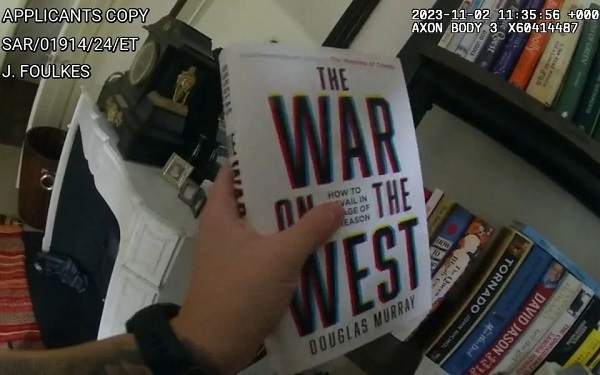
 Censorship Industrial Complex2 days ago
Censorship Industrial Complex2 days agoIn Britain the “Thought Crime” Is Real
-
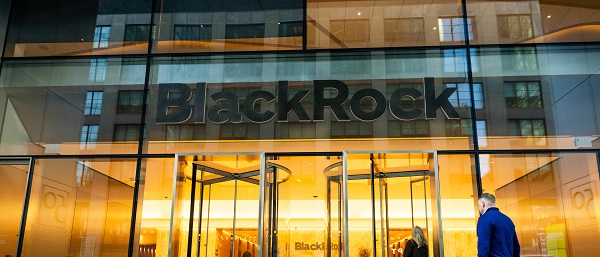
 Business1 day ago
Business1 day agoThe ESG Shell Game Behind The U.S. Plastics Pact
-
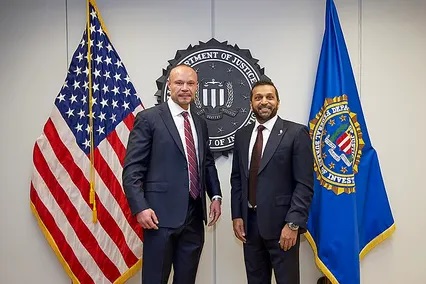
 International24 hours ago
International24 hours agoBongino announces FBI will release files on COVID cover up, Mar-a-Lago Raid and more
-

 Alberta1 day ago
Alberta1 day agoCanada’s oil sector is built to last, unlike its U.S. counterpart
-

 Alberta1 day ago
Alberta1 day agoAlberta’s industrial carbon tax freeze is a good first step
-

 Alberta1 day ago
Alberta1 day agoAlberta’s oil bankrolls Canada’s public services
-

 Crime2 days ago
Crime2 days agoVeteran RCMP Investigator Warns of Coordinated Hybrid Warfare Targeting Canada







